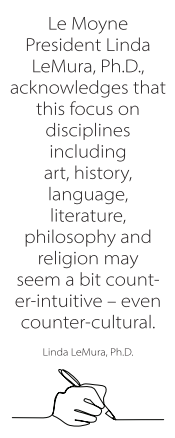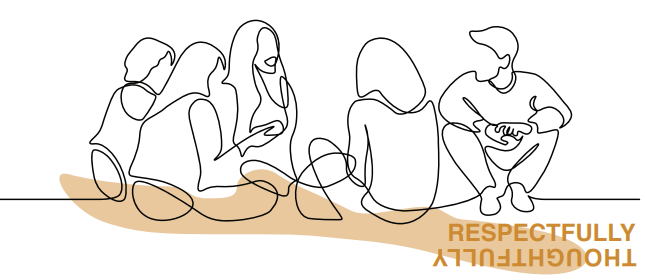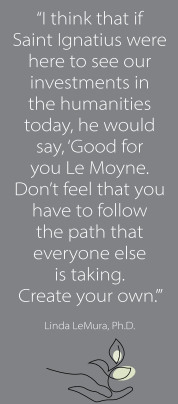In an opinion piece in The New York Times, American philosopher Martha Nussbaum wrote: “The imagination is an innate gift, but it needs refinement and cultivation; this is what the humanities provide.” Despite the contributions of the humanities to an informed citizenry, the preservation and expansion of culture and our understanding of the meaning of humanity, they are under strain across the higher education landscape. A 2018 headline in The Chronicle of Higher Education posed the question “Can Closing a Humanities College Save a University?” Since then, the leaders of some institutions regrettably seem to have decided that the answer is yes. While the humanities have been an integral part of a well-rounded liberal arts education since the Renaissance, they have come to be viewed in some circles as less relevant to the modern world. Funding for the humanities, from the federal government to state and private colleges and universities, has been in decline for a number of years, with no change in sight.
 Here on the Heights, the humanities are thriving. The College recognizes that study of the humanities remains an integral part of liberal arts education in general and Jesuit education in particular. At a time when other schools have elected to reduce funding, the College is devoting more resources to the academic disciplines that make up the humanities. Le Moyne President Linda LeMura, Ph.D., acknowledges that this focus on disciplines including art, history, language, literature, philosophy and religion may seem a bit counter-intuitive – even counter-cultural. But LeMura, a scientist by training who has proudly served on the boards of the Syracuse Symphony Orchestra, Everson Museum of Art and Syracuse International Film Festival, sees the renewed focus on the humanities as absolutely critical. The humanities, she said, lead people to have a greater understanding and more nuanced approach to enduring questions and values that lead to a meaningful and fulfilling life. “Can you imagine life without some of the great works of art and literature with all of their beauty and collective wisdom?” she asked.“How profoundly sad a world without literature and the arts, without philosophical, religious and historical inquiry, would be.”
Here on the Heights, the humanities are thriving. The College recognizes that study of the humanities remains an integral part of liberal arts education in general and Jesuit education in particular. At a time when other schools have elected to reduce funding, the College is devoting more resources to the academic disciplines that make up the humanities. Le Moyne President Linda LeMura, Ph.D., acknowledges that this focus on disciplines including art, history, language, literature, philosophy and religion may seem a bit counter-intuitive – even counter-cultural. But LeMura, a scientist by training who has proudly served on the boards of the Syracuse Symphony Orchestra, Everson Museum of Art and Syracuse International Film Festival, sees the renewed focus on the humanities as absolutely critical. The humanities, she said, lead people to have a greater understanding and more nuanced approach to enduring questions and values that lead to a meaningful and fulfilling life. “Can you imagine life without some of the great works of art and literature with all of their beauty and collective wisdom?” she asked.“How profoundly sad a world without literature and the arts, without philosophical, religious and historical inquiry, would be.”

Le Moyne’s undergraduate curriculum, both through departmental majors and the Core, underscore the
importance of the humanities for the current cultural, social and political moment. The humanities teach us to
communicate clearly and effectively, to make arguments that are cogent and rooted in fact, and to analyze,
understand and respect a multitude of histories and traditions. These are precisely the intellectual skills that are needed to solve some of the world’s most pressing challenges, including war and geopolitical conflict, climate change, the Covid-19 pandemic, and domestic and international threats to democratic governance. Taken together, humanistic disciplines teach students to gather knowledge, ask critical questions, and recognize that many of our most important issues require us to embrace ambiguity rather than settle for a single, unitary answer. What’s more, in an era that is becoming increasingly polarized, characterized by vitriol, anger and ad hominem attacks, the humanities enable us to see each other as companions rather than enemies or rivals.
 The fruits of Le Moyne’s investment in the humanities are already tangible. With the generous support of the Stanley W. Metcalf and D.E. French foundations, faculty in the Department of Philosophy and the Madden School of Business recently carried out a number of initiatives to enhance research and teaching of ethics. Beginning this fall, students in the Madden School will be required to take an applied ethics course, taught by philosophy faculty, to ensure that Le Moyne’s business majors are prepared to make decisions that improve the common good. Thanks to the generosity of James Zogby ’67 and his family, the Eileen McMahon Zogby Annual Lecture has brought renowned scholars of Irish history, culture and society to the College and neighboring communities. With the resources provided her via the O’Connell Professor of the Humanities, Holly Rine, Ph.D., of the Department of History, is pursuing a certificate in Digital Public Humanities that will create new opportunities for colleagues and students interested in this field. A recently launched interdisciplinary minor in Middle East and Islamic Studies offers students a curriculum concentrating on language, religion, history, philosophy and political science. And this fall, Le Moyne will welcome to campus Norrell Edwards, Ph.D., (English) as the newly created 75th Anniversary Endowed Professor of Humanities and Justo Planas, Ph.D., (World Languages) as the newly created Endowed Professor for the Study of the Americas.
The fruits of Le Moyne’s investment in the humanities are already tangible. With the generous support of the Stanley W. Metcalf and D.E. French foundations, faculty in the Department of Philosophy and the Madden School of Business recently carried out a number of initiatives to enhance research and teaching of ethics. Beginning this fall, students in the Madden School will be required to take an applied ethics course, taught by philosophy faculty, to ensure that Le Moyne’s business majors are prepared to make decisions that improve the common good. Thanks to the generosity of James Zogby ’67 and his family, the Eileen McMahon Zogby Annual Lecture has brought renowned scholars of Irish history, culture and society to the College and neighboring communities. With the resources provided her via the O’Connell Professor of the Humanities, Holly Rine, Ph.D., of the Department of History, is pursuing a certificate in Digital Public Humanities that will create new opportunities for colleagues and students interested in this field. A recently launched interdisciplinary minor in Middle East and Islamic Studies offers students a curriculum concentrating on language, religion, history, philosophy and political science. And this fall, Le Moyne will welcome to campus Norrell Edwards, Ph.D., (English) as the newly created 75th Anniversary Endowed Professor of Humanities and Justo Planas, Ph.D., (World Languages) as the newly created Endowed Professor for the Study of the Americas.
In addition to her excitement for these developments on campus, LeMura expects more to come. “I also think there’s going to be a lot of hidden gems and surprises that we just don’t know about yet,” she said. “That’s the other beauty that comes from providing our students and faculty with the space to be creative.”
For his part, Provost and Vice President for Academic Affairs Jim Hannan, Ph.D., said that in a world that often values certitude, the humanities teach Le Moyne’s students to wrestle with ambiguity confidently. The study of the humanities is key to how students assess new ideas, put information into relevant contexts, understand the essential role played by language – through reading, speaking, writing and the study of another language – in the formation of knowledge, and engage in meaningful discussion that, following the teaching of St. Ignatius, asks us to listen attentively and disagree respectfully and thoughtfully.
“The humanities don’t land on a single solution and instead encourage us to be flexible and creative in our thinking,” Hannan said. “Whatever work and careers our students pursue after graduation, they will benefit from a course of humanistic instruction that prepares them for lifelong learning, engagement with the performing arts, and intentional leadership grounded in cultural knowledge, reflective values and critical thinking. Study in the humanities amplifies diverse voices and narratives, provides insight into contemporary issues, and exposes students to the breadth and complexity of the human experience across the centuries and in the present. We engage more purposefully and productively in community and civic life when we are educated in the humanities.”
LeMura said that she “cannot imagine a day in the future of the College where the humanities do not play a central role in the education of our students.” Not only is a commitment to the humanities central to our Jesuit mission, she continued, “it’s a fundamental compact that we have with future generations.” It’s a good thing, for example, for the engineer to be well versed in history, for the accountant to possess an appreciation for philosophy, and for the physician to be able to speak a second language. Le Moyne’s nearly 30,000 alumni know this to be true because they have been the beneficiaries of a well-rounded liberal arts education. It has enriched their lives and their work. They want the same for future generations of Dolphins.
“Nurturing students is a sacred act,” LeMura said. “I think that if Saint Ignatius were here to see our investments in the humanities today, he would say, ‘Good for you Le Moyne. Don’t feel that you have to follow the path that everyone else is taking. Create your own.’ That is certainly what we are striving to do.’”